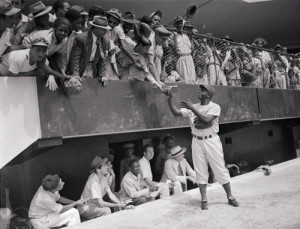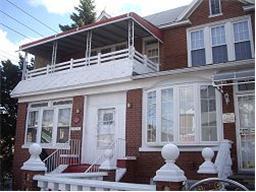
Brooklyn Dodgers
March 06, 1948
Donated by Corbis

NEW YORK (Press Release)–U.S. Senator Charles E. Schumer, joined by City Councilman Jumaane Williams, Congresswoman Yvette Clarke and other advocates, on Monday, May 19, urged the New York City Landmark Preservation Commission to reverse course on its decision and designate the home at 5224 Tilden Avenue in East Flatbush, once occupied by Jackie Robinson, as a historical landmark. Jackie Robinson and his family lived in the house during the time he received the Most Valuable Player and the Rookie of the Year Awards for the Brooklyn Dodgers. Robinson was Major League Baseball’s first African American player to receive these awards.
Schumer put his full support behind a national campaign, launched by City Councilman Jumaane Williams, and urged New York City to provide a landmark designation for this building, so that it cannot be altered or knocked down. Schumer explained that by granting New York City landmark status to the house on Tilden Avenue, the city would first and foremost, honor this trailblazer’s important time spent in East Flatbush, would help preserve the home and would ensure continued interested in Jackie Robinson’s legacy on a local and national level.
“5224 Tilden Avenue was the home of number 42, the one and only Jackie Robinson, and so, it’s without question that this house has special significance to the African American community, the Brooklyn community and to New York City as a whole,” said Schumer. “Having paved the way for African American athletes and leaders, Jackie Robinson is a civil rights hero and baseball legend. The significance of this home cannot be understated and so, the New York Landmark Preservation Commission should recognize 5224 Tilden Avenue as a historic landmark. Thank you to Councilman Jumaane Williams for first pitching this idea and shedding light on this important issue.”
“I am pleased that Senator Schumer has joined me in calling the New York City Landmarks Preservation Committee to recognize Jackie Robinson’s house. I strongly believe that there is a continued need to address racial and ethnic bias and tensions in New York City, which is why it is more important now than ever to raise up symbols like this house, not only to advance social equality, but to use as an education establishment for youth to learn from for years to come. Jackie Robinson’s house had a strong impact on the community, which was not only about stolen bases and home runs, but about blacks uniting with Jews against intolerance and breaking color barriers off the field. It serves as a symbol of an era where brave Americans, both black and white, stood up against racial intolerance & bigotry, which took place in Brooklyn,” said Council Member Jumaane D. Williams, Deputy Leader.
“The home in which Jackie Robinson resided when he played for the Brooklyn Dodgers will forever remain a cherished part of the history of our nation and of the community we share in Brooklyn. His dignified and very personal challenge to the evil system of racial segregation that persisted at that time in Major League Baseball and throughout the United States, either by law or by tradition, required enormous personal courage and fortitude. The trail he blazed continues to inspire the subsequent generations who are the beneficiaries of his work,” said Congresswoman Clarke. “The designation of the home Jackie Robinson shared with his wife, Rachel, as a New York City Landmark speaks to the significance this residence holds in the hearts and minds of all New Yorkers, the collective pride we share in the Jackie Robinson’s talent and sacrifice and will allow us the opportunity to reflect on the importance of his legacy in our time.”
Last year, the New York City Landmark Preservation Commission determined that 5224 Tilden Avenue was not eligible to be designated as a landmark. The Commission believes that Jackie Robinson’s family lived in the house between April 1948 and May 1949, and therefore the house does not sufficiently commemorate his life work.
Schumer said that research indicates, however, that Jackie Robinson and his family lived in the house between 1947 and 1949. Robinson’s acquisition by the Brooklyn Dodgers in 1947 made him the first African American to play in Major League Baseball (MLB), meaning that he, broke through that significant racial barrier while living in East Flatbush. What’s more, Robinson lived in the home during the time that he received the MVP and Rookie of the Year awards, which he was the first African American to receive.
Robinson lived in the home during a time of significant racial tension. In 1920’s, Eleanor and Christopher Palin moved to Brooklyn from North Carolina and began purchasing properties around Brooklyn; one such property was 5224 Tilden Avenue. Eleanor Palin, who was African American, was often mistaken for being Caucasian because of her light skin complexion and was therefore able to successfully purchase the property. When the neighborhood learned that the Palins were African American, a petition was circulated to prevent the them from closing on the house. The family then began renting out the apartment on Tilden Ave simultaneously to when the Brooklyn Dodgers were in search of a home for Jackie Robinson. Jackie Robinson’s family rented the apartment until the birth of Jackie Jr.
The Palins left ownership of the house to their niece, Rose Bowman, and several cousins. Rose’s daughter, Tonya Wheelock, is now a leading advocate in preserving 5224 Tilden Avenue. Schumer also noted that Mrs. Rachel Robinson, who could not join the event, also continues to carry on her husband’s legacy with grace, almost 40 year after his death.
In 1975, the Tilden Avenue house was designated a national landmark on the National Register of Historic Places. According to the nomination form’s statement of significant, “the years 1945-1947 were milestones in the history of Afro-American participation in American sports. John Roosevelt ‘Jackie’ Robinson was afforded the opportunity to be the man instrumental in ‘breaking through the color barrier’ in Major League Baseball when the Brooklyn Dodgers signed him to their minor league team, the Montreal Royals in 1945, and then to the major league Brooklyn Dodgers in 1947.”
The East Flatbush home is on the National Register of Historic Places, but the NYC landmark designation is much stricter in terms of preservation of the site: it will ensure that the house is never altered. The National Register doesn’t prevent a private owner from altering the site, and does not require that it to be opened to the public. According to the Historic Districts council “A New York City district is overseen by the local Landmarks Preservation Commission and protects the character of the district through the local Landmarks law. A National Register District is recognized through the U. S. Department of the Interior and administered by the New York State Historic Preservation Office. National Register of Historic Places listings are largely honorific and usually do not prevent alterations or demolitions of structures within the district, but may entitle owners to tax benefits”.
Schumer called on the New York City Landmark Preservation Commission to designate 5224 Tilden Avenue as a New York City historical landmark. According to its website, The Landmarks Preservation Commission (LPC) is responsible for protecting New York City’s architecturally, historically, and culturally significant buildings and sites by granting them landmark or historic district status, and regulating them once they’re designated. In his letter, Schumer explained that the home is a source of civic pride and promotes historical significance in New York City. Schumer said that this designation would stabilize and improve property values, protect the home for tourists, strengthen the local economy in East Flatbush, and promote educational activities related to Robinson’s groundbreaking life.
*
Preceding provided by Senator Charles Schumer